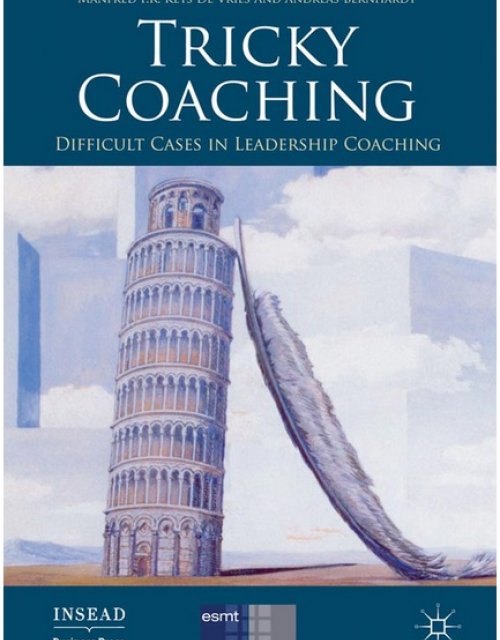Publication records
Subject(s)
Human resources management/organizational behavior
Secondary Title
Tricky coaching: Difficult cases in leadership coaching
Pages
106–114
ISBN
978–0230280229
Subject(s)
Human resources management/organizational behavior; Strategy and general management
Keyword(s)
Coaching, leadership development, leadership coaching, coach, difficult cases, helping profession
This groundbreaking book takes an unusually objective look at the realities of executive coaching from the coach’s point of view. This is not just any group of coaches , nor are these ordinary stories. In a departure from most books on the topic, we’ve invited coaches who work senior executives and star performers who share their insights about the difficulties of coaching.
As any coach knows, coaching often gets tricky. What initially seems clear later becomes confused; the client may turn out to be someone else entirely; boundaries can easily become blurred; and the coach’s own emotions or values may influence outcomes. But the fact is that many tricky situations can be turned around if the coach stays grounded in objective coaching protocols.
Responsible coaches understand the need to explore and define the boundaries of coaching – to help define coaching protocols that will help coaches in tricky situations and , more importantly, to develop their own skills and self-awareness. In this book, we draw on case notes shares with us by experienced coaches, coaching educators, and coaching researchers, and provide a body of evidence that will help the profession evolve in the direction of coherence, standard protocols, and rigorous evaluations.
This rich collection includes reflections on why people become coaches (and why some people should not); advice on how to write up case notes; and an overview of common situations that lead to trickiness. Even more powerful are the open and honest stories of coaches themselves, as they share their efforts to continually seek greater understanding about the interpersonal and intrapersonal dynamics that come into play in executive coaching.
Pages
264
ISBN
978-0230280229
Subject(s)
Human resources management/organizational behavior
Keyword(s)
psychodynamics, leadership, leadership development
A pdf file of this working paper may be available at INSEAD.
Subject(s)
Marketing
Keyword(s)
self-control, goals, temptation
Secondary Title
Self and identity (SAGE Library in Social Psychology)
Pages
299–308
Subject(s)
Strategy and general management
Keyword(s)
co-creation, corporate responsibility, sustainability, stakeholders
Volume
11
Journal Pages
35–38
Subject(s)
Strategy and general management
Keyword(s)
Corporate responsibility, sustainability, stakeholders
Volume
5
Journal Pages
44–47
Subject(s)
Economics, politics and business environment
Secondary Title
Quantification of harm to competition by national courts and competition agencies
Pages
21–48
Subject(s)
Strategy and general management
Keyword(s)
Sustainability, CSR, stakeholder
Volume
6
Journal Pages
58–63
Subject(s)
Economics, politics and business environment
Keyword(s)
competition, Germany
Secondary Title
The handbook of competition economics 2012
Pages
43–44
